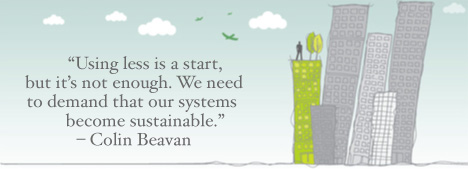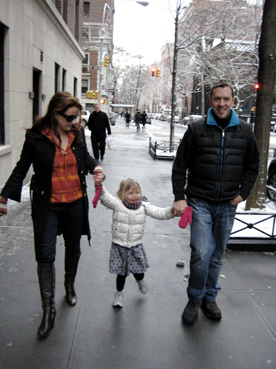‘No Impact Man’ Recycled
Daniel Levis Keltner
Oscilloscope Laboratories
U.S. Release: September 11, 2009

Colin Beavan, the self-proclaimed No Impact Man, has gotten trashed enough over his year of zero waste. If Beavan’s crusade isn’t practical enough to inspire the world to quit using toilet paper, those of us who are hopeful for a brighter future can at least glean from his story an important lesson in social change.
For those unfamiliar with Beavan and his No Impact Project, he and his family lived a zero environmental impact lifestyle in the heart of New York City. For one year, they lived without carbon producing transportation, electricity, consumer shopping, and subsisted on only locally grown foods, all the while creating no trash. Beavan kept a blog and video documented the process. Afterwards, the book, No Impact Man: The Adventures of a Guilty Liberal who Attempts to Save the Planet and the Discoveries He Makes About Himself and Our Way of Life in the Process, was released in 2009, followed by an award-winning documentary.
After catching the “Average Joe Single-Handedly Saves the Planet” trailer for the No Impact Man documentary, I admit that I aimed to join the ranks of the Beavan Bashers, from global warming skeptics to anti-radical environmentalists alike, and to publicly slay this educated upper-middle class white guy and his high ideals in the form of a class-conscious movie review. However, having surveyed the entire No Impact project—documentary, blog, and book—I find it impossible to ridicule a guy who empathized with the drowning polar bears enough to adopt saving the ice caps as a moral imperative.
Some critics assert that Beavan’s environmental extremism amounts to little more than a shameless publicity stunt. The documentary makes clear, however, that such assertions are baseless. If for no better reason, Beavan exhibits all the signs of the authentic zealot—excessive sensitivity to setbacks, Christ-like guilt for the ecological sins of our world, and an inability to take stock of his partner’s desires because they inconvenience his master plan. Being No Impact Man is so tightly tied to Beavan’s personal identity that he even experiences postpartum depression after having finished birthing the project. Of course, critiquing a person’s authenticity is only one of many snarky ways that pundits disregard the legitimate concerns and perspectives of others.
That is not to say No Impact Man has all the answers. The life of an Eco-Superman is not what is documented, but instead the naiveté, passion, and growth of a budding activist learning how to enact change. Whereas the book serves the more practical function of informing and inspiring environmentalist action, the documentary best informs the endeavor of social action itself. At the film’s start, Beavan frames his project as a simple experiment to discover what consumers are willing to and/or able to give up, posing the question “Is it possible? Is it practical?” He proceeds to go cold turkey, embarking on his metamorphosis as No Impact Man. Like any purist, however, it isn’t long before his personal ethical decision becomes a smoldering martyrdom for those who won’t similarly abandon their physical comforts. Despite a rhetoric of compassion, Beavan begins to make his wife feel like an awful person for wanting a cup of coffee or a new purse, not solely because these items cause environmental impact but because complete self-abnegation isn’t one of her virtues.
Beavan weathers challenges from his wife on issues of purity until his city garden plot friend, Mayer Vishner, calls him out as “either dishonest or delusional” if he believes in the romantic notion that personal sacrifice can make the world a better place. “If anybody really thought that you were going to have an impact [on American corporate capitalism],” Vishner says, “you wouldn’t be getting the attention you’re getting.” Beavan is then shaken up enough to realize that although he might be making zero environmental impact on the earth, he’s making about as much impact on the systems that profit and proliferate by means of environmental injury.
Not long after this wake-up call, the No Impact Man is speaking to his state representative and joining grassroots organizations that focus on community building. “Using less is a start, but it’s not enough,” Beavan admits. “We need to demand that our systems become sustainable.” By refocusing his values from eco-purity to fostering community, Beavan’s message matures—a good world is no longer measured by the quality of the earth, water, and air alone but equally by the quality of one’s social environment. Of course, he never rejects the value of taking personal responsibility for the world, which he believes every individual is complicit in creating and is necessary to foster any social action.
The No Impact Man documentary isn’t worth sitting through for the trials and triumphs surrounding one man’s activist endeavor, although there’s enough gossip, disagreements, and weeping to keep the film on par with the best of reality TV. Instead, Beavan’s philosophical development is what makes the film worth watching and, ultimately, what makes this guy worth listening to.

Ironically, in the documentary, Beavan’s wife, Michelle Conlin, has the most compelling personal story, as well as the most original point of view. Despite being pitched as the mascot for our consumerist American nightmare, who makes a complete 180 (okay, more like a 140) due to Beavan’s influence, from the start Conlin provides a number insightful assessments of her husband’s project and the meaning of modern living. Conlin’s most poignant monologue is her mourning over losing “the wanting part” of her being, when she asks, “Without wanting, what’s left?” At first, it seems that Beavan is justified in taking the moral high ground when negotiating family politics with his wife because her desires are easily fulfilled by iced quad espressos and designer handbags, not zero waste. But after Beavan’s project is through and he experiences a similar existential void (“Yesterday I was No Impact Man. What am I today? Moderate Impact Man?”), it’s clear he could learn a thing or two if he humbly asked Conlin a question that he didn’t already know the answer to—she spent the whole year resolving that crisis for herself.
When you add up the entire No Impact Project, Beavan has proved that even if he is wrong he will learn, adjust his approach, and keep fighting the good fight. With his ability to temper his efforts by the wisdom and love of others, Beavan heralds a welcomed paradigm shift in pop culture’s conception of ecological responsibility: the disassociation of the green movement from both the buying of eco-friendly products and old-fashioned guilt and sacrifice, and a more constructive association with the building of communities, fostering well-tended relationships across a well-tended planet.
Daniel Levis Keltner, Visual Arts Editor

0 comments on “Review: Keltner”